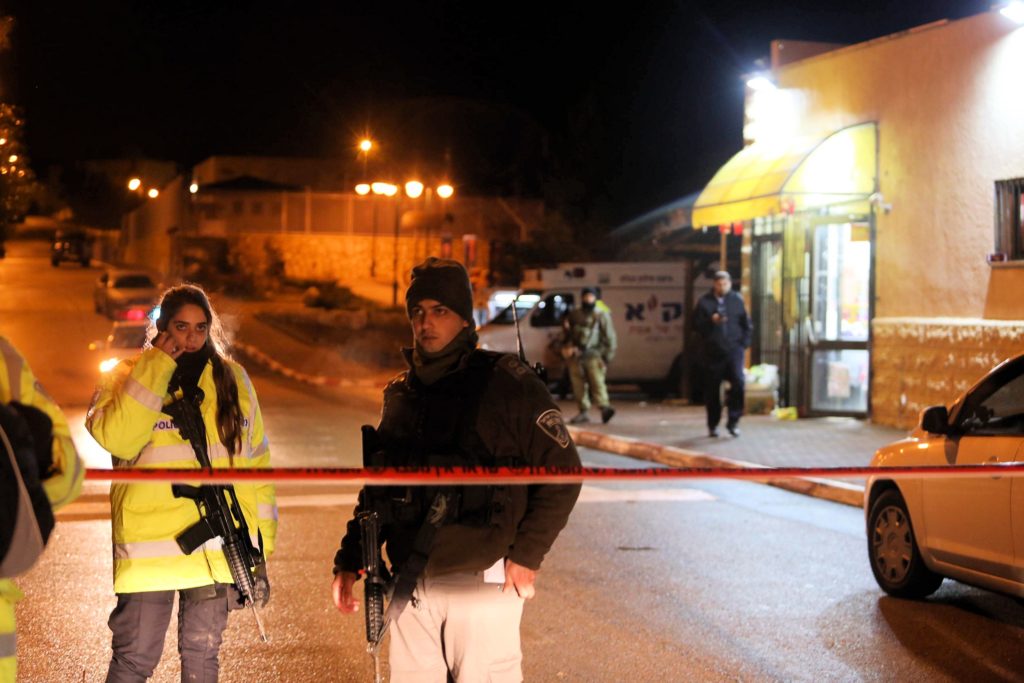Australia/Israel Review
Behind the News – February 2016
Feb 9, 2016 |

TERROR AND ROCKET REPORT
On Dec. 14, a Palestinian driver rammed passengers at a bus stop in Jerusalem, critically injuring a baby and injuring ten other people. On Jan. 1, Israeli Arab Nashat Milhem carried out a shooting attack in central Tel Aviv, killing Shimon Ruimi, 30, and Alon Bakal, 24, and wounding seven others. Milhem then hailed a taxi and subsequently killed the driver, Amin Shaaban, a Bedouin father of 11.
On Jan. 17, a 16-year-old Palestinian terrorist entered the West Bank settlement of Otniel and stabbed to death 39-year-old mother of six Dafna Meir outside her home, as some of her children watched. On Jan. 25, two Palestinians stabbed two Israeli women and threw pipe bombs at a grocery store in the West Bank settlement of Beit Horon, killing Shlomit Krigman, 23.
On Dec. 13, a rocket from Gaza hit open space in the Negev. On Dec. 17, a rocket fired from Gaza fell inside the Strip. On Jan. 1, four rockets were fired from Gaza at Israel.
Throughout the past six weeks, numerous other Israelis, both civilians and soldiers, were injured in almost daily attacks involving cars, knives, shootings, rocks, Molotov cocktails and IEDs.
Meanwhile, two Jewish terrorists have been charged in Israel over the attack last July in which three members of the Dawabshe family in the West Bank village of Duma were murdered when their house was firebombed as they slept. Amiram Ben-Uliel, 21, was charged with three counts of murder, attempted murder, arson and conspiracy to commit a hate crime. A minor who, due to his age could not be named, was charged with being an accessory.
SYRIA STRIKE KILLS NOTORIOUS TERRORIST
On Dec. 19, an aerial strike near Damascus killed a number of people including notorious Lebanese terrorist Samir Kuntar. Kuntar had been imprisoned by Israel following an infamous 1979 Popular Front for the Liberation of Palestine (PFLP) terror attack in which he infiltrated Israel from Lebanon and killed a four-year-old girl, whose head he smashed in, and her father. Since his release in 2008 in exchange for the bodies of Israeli soldiers killed by Hezbollah, he had again become involved in terrorism. At the time of his death, Kuntar was leading a terror cell in the Syrian Golan Heights and was allegedly planning an attack against Israel. The day after Kuntar’s death, which Hezbollah blamed on Israel, a number of rockets were fired from southern Lebanon into Israel, apparently by Ahmed Jibril’s Popular Front – General Command, striking open areas near Nahariya. Israel responded with artillery fire into Lebanon.
IRANIAN PROXIES ON THE MOVE
An upstart Iranian-backed terror group has been making inroads in the West Bank and Gaza. The group, Harakat al-Sabireen, has been active in the Palestinian-controlled areas since 2014, but has been stepping up its presence in recent months fuelled by a US$10 million annual bankroll from Teheran. According to reports, Iran decided to launch Harakat al-Sabireen out of displeasure with Hamas and Palestinian Islamic Jihad, which it saw as not supportive enough of Iran’s policy in Syria.
Meanwhile, in Nigeria, the Islamic Movement of Nigeria (IMN) – a militant Shi’ite group aligned with Iran – reportedly attempted to assassinate the country’s Army Chief of Staff, Lt. Gen. Tukur Buratai, on Dec. 12. The incident led to an outbreak of intense fighting between the Nigerian military and Shi’ite strongholds with many casualties reported. The leader of the IMN, Ibrahim Zakzaky, was arrested.
IRAN VOWS TO DEFY MISSILE SANCTIONS
In defiance of UN Security Council Resolutions and newly imposed sanctions, Iranian Defence Minister Brigadier General Hossein Dehqan has vowed to continue to develop and test nuclear-capable ballistic missiles, saying Iran will demonstrate the ineffectiveness of sanctions “by displaying new missiles.” A statement issued by Iran’s Foreign Ministry on Jan. 18 denied its missiles were designed to carry nuclear warheads – although security and intelligence analysts believe otherwise.
Last March, US Director of National Intelligence James Clapper assessed that Iran’s ballistic missiles are “inherently capable of delivering WMD,” while a UN panel in December agreed, finding Iran’s recent missile tests violated resolutions barring Iran from building nuclear-capable missiles.
NOT PLAIN SAILING
The international governing body of the sport of sailing announced on Jan. 24 that it is investigating the Malaysian Organising Authority of the World Sailing Youth Championships after the Israeli delegation was prevented from participating in the championships in Langkawi, Malaysia. This meant that sailboard champions Yoav Omer and Noy Drihan were unable to defend their titles. The Israeli Sailing Authority announced that it would not be competing as the delegation still had not received their visas 24 hours before the event was due to commence, and because organisers had informed them that they would not be permitted to compete under Israel’s flag or to wear any symbol identifiable with Israel. Meanwhile, Judit Farrago, CEO of the International Table Tennis Federation, warned on Jan. 7 that Malaysia would be banned from holding any further international events unless it gave visas to the Israeli team for next month’s world team championships there. The warning came after the Israeli team was yet to receive visas despite working with Malaysian authorities for months.
“DAVID’S SLING” TO BECOME OPERATIONAL
The joint US-Israel “David’s Sling” missile defence system passed its final test on Dec. 21, demonstrating its ability to destroy long-range rockets and short-range ballistic missiles. The IDF plans to deploy four David’s Sling batteries, with the Air Force receiving two in the first stage. David’s Sling has an interception range of 200km designed to defend against low-flying cruise missiles as well as larger rockets and tactical ballistic missiles. It could be used to defend against Syrian 302mm rockets, Iranian half-ton warhead-bearing Fatah-110 rockets in the hands of Hezbollah and Scud B-class ballistic missiles. David’s Sling was designed to fill the defence system gap between Iron Dome – with its range of 40km to 70km – and the Arrow system, which can shoot down ballistic missiles above the atmosphere.
Meanwhile, Israel and India have jointly developed the Barak 8 missile system, which is designed to protect naval ships and offshore gas rigs from hostile aircraft, missiles and rockets. It is expected to become operational in both navies within the next two years.
ISRAEL’S PLAN TO TACKLE ISRAELI ARAB INEQUALITY
On Dec. 30, Israel’s cabinet approved a five-year plan worth around 15 billion shekels (US$3.85 billion) for social and employment development for Israel’s Arab community. The plan seeks to improve education, public transportation, highway infrastructure, employment, public security, law enforcement, sports and community services, as well as facilitate the future construction of tens of thousands of housing units in minority communities. Israel’s Minister for Social Equality Gila Gamliel called it “an important and historic step”, adding, “The government of Israel is changing the mechanism for funding ministries so that Israeli Arabs will get their fair share of the state budget.”
ISRAEL REPORTS ANOTHER LARGE GAS FIND
An Israeli exploration group has recently discovered what could potentially be its third-largest offshore natural gas field. Geological surveys have suggested that the field – named “Daniel” – discovered by the group led by Isramco Negev and Modiin Energy, could hold 8.9 trillion cubic feet of natural gas.
That would make it nearly as big as the Tamar field, which holds 9.9 trillion cubic feet of gas and is the largest field being tapped. However, the as yet untapped Leviathan field contains around 22.9 trillion cubic feet.






